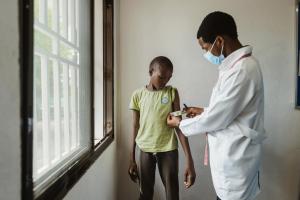Boosting efforts to transform care for severe chronic diseases in Africa
Dar es Salaam – Health experts from across Africa, policymakers, civil society organizations and partners meeting for the first-ever conference on strengthening efforts to address the burden of severe chronic disease have called for increased recognition of the emergency presented by noncommunicable diseases and the premature deaths they cause.
The International Conference on PEN-Plus in Africa (ICPPA) meeting, held from 22 to 25 April 2024, highlighted “grossly inequitable access to prevention, diagnosis, treatment and ongoing care” and committed to advocate for increased focus on chronic and severe noncommunicable diseases (NCD) within existing health systems, and extending prevention, diagnosis, treatment and quality care to the primary health level.
The meeting in Tanzania’s commercial capital Dar es Salaam called on governments to provide leadership in public health to ensure adequate and quality services, to act to reduce the known risk factors for NCDs and to increase domestic investments.
The conference, which was dedicated to mainstreaming strategies to alleviate the burden of severe chronic diseases at first-level referral health facilities, highlighted the urgency of decentralizing care for type 1 diabetes, sickle cell disease, and rheumatic and congenital heart diseases, to save millions of lives over the next decade, including those of many children and young adults afflicted by these conditions.
In the African region, healthcare services for severe NCDs are predominantly confined to major urban centres, leaving countless individuals without sufficient care and burdened with high financial costs.
Hosted by the Government of Tanzania, in collaboration with the World Health Organization (WHO) in the African region and other partners including Helmsley Charitable Trust, the three-day event provided a platform for health experts, policymakers, civil society organizations, donors, private sector representatives and NCDs affected persons, survivors and community advocates to expedite political and financial backing for PEN-Plus, an innovative healthcare delivery model birthed in Africa.
“We are honoured to have you all here for this critical conference at a time when hundreds of thousands of Africans of all ages suffer preventable, premature deaths from NCDs due to health inequities. This is a chance for us to unite to advance regional efforts to tackle the crisis, by investing in and scaling up PEN-Plus,” said Hon. Ummy Mwalimu, Minister of Health of the United Republic of Tanzania.
Participants delved into strategies to reinforce NCD management within health systems continent-wide and sought collaborative opportunities to align PEN-Plus with other regional public health programmes.
“Africa is severely affected, and in the region, more than any place in the world, NCDs are called ‘the silent epidemic’,” said Dr Matshidiso Moeti, WHO Regional Director for Africa. “Africa must invest more now in addressing NCDs with adequate and sustained resources. With support from partners, we aim to strengthen the implementation of the PEN-Plus Regional Strategy, mainstream the prevention and control of chronic and severe NCDs in the region and ensure that people living with these chronic and severe conditions receive the lifesaving care they deserve.”
All 47 member states of the WHO African region have endorsed the model as their official strategy for caring for individuals with severe NCDs. To date, 17 countries have initiated PEN-Plus, with 11 actively implementing the programme.
The PEN-Plus strategy expands upon the WHO PEN (Package of Essential Noncommunicable disease interventions), which decentralizes care for common NCDs to primary healthcare facilities. PEN-Plus extends this care to first-level referral facilities, such as district hospitals, and has demonstrated significant success in increasing patient access to treatment for severe NCDs, improving patient outcomes.
“PEN-Plus addresses a critical gap in health care for the world’s poorest billion, bringing lifesaving care for severe NCDs to first-level rural hospitals for the first time. It also bridges major gaps in health systems for training, mentorship and referral pathways,” said Dr Ana Mocumbi, co-chair of the NCDI Poverty Network.
The Government of Tanzania, WHO Africa, and The Leona M. and Harry B. Helmsley Charitable Trust co-sponsored the conference, with the NCDI Poverty Network serving as a technical partner.
"PEN-Plus showcases the lifesaving impact of collaborating with local health leaders and designing health systems around people," said Dr Gina Agiostratidou, type 1 diabetes Program Director for the Helmsley Charitable Trust. "Now, children with noncommunicable diseases in rural areas can receive the care they need to lead full, vibrant lives. At ICPPA, we have had the opportunity to join partners in discussing how we can expand the program to reach even more communities."
The consensus among experts, leaders, and partners at the conference is clear: PEN-Plus is a reliable system with a proven track record, capable of delivering lifesaving care to those with severe NCDs in rural sub-Saharan Africa – investing in PEN-Plus represents a historic and pivotal collective action that will save and improve millions of lives, reduce healthcare costs, enhance health system capacities, boost productivity, promote equity, and contribute to achieving Universal Health Coverage and the Sustainable Development Goals.



